Welcome to my "New World Music" page, which highlights new(ish) African, Asian, Latin American and Celtic records, and "miscellaneous" records that I had the good fortune to check out in February, 2013 This page is added to as new records come in... If you want more to read more reviews, many others are archived nearby, and there are separate sections for various kinds of world music that you might like exploring as well.
Recommended Records: February, 2013 | Review Archives | World Music Index
Mario Adnet "Amazonia" (Adventure Music)
Sacha Distel "With Love From Sacha" (Jasmine)
K. Frimpong "...And His Cubano Fiestas" (Secret Stash)
Mauricio Maestro "Upside Down" (Far Out)
Paul Mauriat "Exclusivamente Brasil, v.3" (Dutton-Vocalion)
Nilson Matta "Black Orpheus" (Motema)
Tunji Oyelana "A Nigerian Perspective: 1966-79" (Soundway)
Ballake Sissoko "At Peace" (Six Degrees)
Richard Thompson "Electric" (New West)
Marcos Valle "Marcos Valle" (Light In The Attic)
Marcos Valle "Garra" (Light In The Attic)
Marcos Valle "Vento Sul" (Light In The Attic)
Marcos Valle "Previsao Do Tempo" (Light In The Attic)
Various Artists "SOUTH INDIA: MUSIC OF THE NILGIRI HILLS" (Ocora)
Various Artists "PUTUMAYO PRESENTS: VINTAGE FRANCE" (Putumayo)
Aime Barelli "Un Ange Comme Ca" (Marianne Melodie)
Lecuona Cuban Boys "In South America: 1940-1944" (Harlequin)
Pedro Miranda "Coisa Com Coisa" (Deckdisc)
Teroca "Elos Da Samba" (Tratore)
Various Artists "PARIS, PLAGES D'HAWAII" (Paris Jazz Corner)
![]() Mario Adnet "Amazonia" (Adventure Music, 2013)
Mario Adnet "Amazonia" (Adventure Music, 2013)

(Produced by Mario Adnet, Joana Adnet & Antonia Adnet)
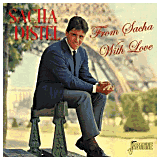 Sacha Distel "With Love From Sacha" (Jasmine, 2013)
Sacha Distel "With Love From Sacha" (Jasmine, 2013)


First known for his work as a jazz musician and accompanist, French guitarist Sacha Distel broke out as a solo star in the late 1950s, singing robust pop vocals with a jazzy flair. This generously programmed single-disc set focusses on his work as a singer, with the first half all English-language recordings and the second half of French material. The French-language stuff is a best, with a bunch of cover tunes performed in the rock'n'roll-meets-big band sound of the '50s and early '60s. Lots of pure, corny fun -- folks who enjoy French ye-ye rock music will get a kick out of this, as well as his covers of Brazilian bossa nova hits such as "Chanson Sur Une Seule Note" (aka Tom Jobim's "One Note Samba") and his own bossa-flavored "Les Cariocas." The softer ballads may be too schmaltzy for many listeners, although lounge fans will be psyched. An excellent introduction to his work.
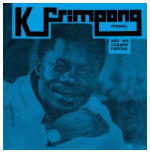 K. Frimpong "...And His Cubano Fiestas" (Secret Stash, 1976/2012)
K. Frimpong "...And His Cubano Fiestas" (Secret Stash, 1976/2012)

(Produced by Dr. Oppong Gordon)
Very, very cool. From the band name, I'd expected an early-'60s style Latin dance-by-way-of-Africa set, but was pleasantly and profoundly surprised by the subtle, multi-textured mix of African highlife, reggae and groove music. Ghanaian bandleader Alhaji K. Frimpong produced a real gem here, adding several new layers to the African pop of the era, producing an album with a fairly unique sound. Most notable is the open, uncompressed sound mix, in which all the different instruments can be clearly heard, as opposed to many albums where percussion and other instruments give way to more dominant guitars and horns -- here, each note of the drums and percussion hangs in the air, clear as a bell, as do the meandering keyboard riffs, which add a kind of lazy, trancelike feel, similar to the Ethiopian groove music of the same era. This is nice stuff, and will add a lot to any mix of classic Afro-Pop. Highly recommended!
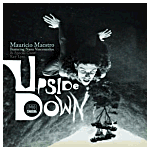 Mauricio Maestro "Upside Down" (Far Out, 2011)
Mauricio Maestro "Upside Down" (Far Out, 2011)


A new collaboration -- recorded in 2010 -- from two Brazilian experimental musicians whose partnership spans back to the early 1970s. Guitarist Mauricio Maestro and percussionist Nana Vasconcelos rekindle their creativity with this mellow, melodic set which is primarily instrumental music, punctuated by nonsensical vocalizations, simple chanted refrains, and on a few tunes, full lyrics. It's similar in style to the amorphous folk-jazz-MPB of Vasconcelos or Milton Nascimento, but Maestro -- who co-founded the 1980s pop group Boca Livre -- has a more pointedly "pop" approach, with light, lilting melodies and a joyful vibe filing the sound. It's a little Sufjan Stephens-y, and easy on the ears... Singer Kay Lyra sings on several tracks, reprising the role that Joyce played on the Maestro/Vasconcelos session, Visions Of Dawn in 1976. A little gooey, but pretty listenable overall... Definitely worth a whirl!
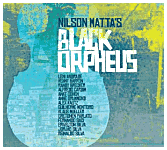 Nilson Matta "Black Orpheus" (Motema, 2013)
Nilson Matta "Black Orpheus" (Motema, 2013)


(Produced by Nilson Matta & Klaus Mueller)
Brazilian-born jazz bassist Nilson Matta is part of the first generation that grew up with bossa nova in the air, and key to that experience was the music from Vinicius de Moraes and Tom Jobim's Orfeu Da Conceicao, a 1956 stage play that became the basis for the French film Black Orpheus. The music was revolutionary: Jobim, along with guitarists Luiz Bonfa and Joao Gilberto, had created a new musical dialect for Brazil, and within a matter of years, the sound swept across the globe, with a particularly powerful impact on the jazz world. Matta revisits and reinterprets Orfeu, adding a few new originals to the mix, and hosts a large ensemble of Brazilian and American artists, including veteran players Kenny Barron and Randy Brecker, as well as Braz-jazz vocalist Leny Andrade, who sings on a couple of tracks, complimented by newcomer Gretchen Parlato, who adds a brighter, more supple tone on others. A calm, confident mainstream jazz album with solid Brazilian roots.
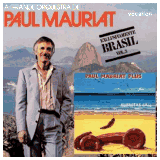 Paul Mauriat "Exclusivamente Brasil, v.3" (Dutton-Vocalion, 1980/2012)
Paul Mauriat "Exclusivamente Brasil, v.3" (Dutton-Vocalion, 1980/2012)

(Produced by Gerard Gambus & Armando Pittigliani)
French bandleader Paul Mauriat dipped into Brazilian themes in the 1970s, traveling to Rio and recruiting Brazilian musicians to play on his perky, disco-tinged easy-listening renditions of various contemporary samba and MPB hits. The song selection on the album (originally from 1980) is actually pretty strong, spanning uptempo carnaval sambas such as Noca da Poertela's widely-covered "E Preciso Muito Amor" to mellower MPB by composers such as Ivan Lins, Joao Nogueira and Rita Lee. It's surprisingly up-to-date, though you have to be a pretty dedicated easy listening fan to make it through all of this -- still, if you are into mellow muzak, it's kind of nice to have a samba tinge thrown into the mix... The musicianship is genuine and authentic, though the arrangements and slick production are pure Mauriat. Alas, the CD reissue doesn't include info on who the Brazilian musicians were, other than the participation of producer/arranger Armando Pittigliani; Volumes 1 and 2 remain out of print.
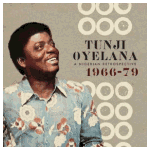 Tunji Oyelana "A Nigerian Perspective: 1966-79" (Soundway, 2012)
Tunji Oyelana "A Nigerian Perspective: 1966-79" (Soundway, 2012)


A fun, rugged, idiosyncratic guitar-pop from Nigeria, with an unruly mix of funk, highlife and Western rock that sets it aside from the classic highlife sounds that were coalescing at the time. If you're looking for some African pop with rough edges and little bite, this might be worth checking out.
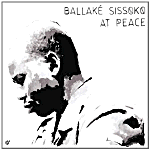 Ballake Sissoko "At Peace" (Six Degrees, 2013)
Ballake Sissoko "At Peace" (Six Degrees, 2013)


(Produced by Vincent Segal)
A lovely, melodic, meditative set by Malian kora player Ballake Sissoko, joined on many tracks by cellist Vincent Segal, who previously collaborated with Sikkoso on the 2011 album Chamber Music. This is beautiful music, stuff that makes you slow down and adjust yourself to a more contemplative tempo. It's not new age-y or muzak, but it is a very calm, measured music, and many listeners -- fans of Toumani Diabate, et. al. -- will enjoy it greatly. One treat for this fan of Brazilian music, amid all the African melodies, was the unexpected addition of Luiz Gonzaga's "Asa Branca," one of the greatest and best-known oldies in the Brazilian canon. A sweet record which will captivate many listeners.
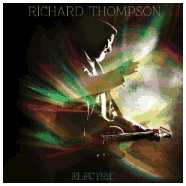 Richard Thompson "Electric" (New West, 2013)
Richard Thompson "Electric" (New West, 2013)


(Produced by Buddy Miller)
British folk-rock elder Richard Thompson finds an an eager collaborator with roots/Americana insider Buddy Miller, who produces this album and adds some tasty guitar licks that compliment Thompson's own idiosyncratic style. This album boasts a strong selection of songs, each one moody, clever and compelling, defined by aching, deliberate melodies and subtle yet memorable hooks. As the album title implies, this is a rock-oriented set, but it's slyly punctuated with country/bluegrass touches, particularly fiddle riffs from bluegrasser Stuart Duncan and occasionally by Thompson's own mandolin. The performances are tightly focussed with every musician concisely adding to the songs, and Thompson himself in fine form. Particularly noteworthy are the harmony vocals, with English-born Nashviller Siobhan Maher Kennedy adding supple harmonies on several songs, reminiscent in turns of Kate Bush and even Richard's ex, Linda Thompson. Like many folk/roots artists, as a young man, Thompson affected a worldliness and cynicism that belied his years, though now well into his '60s, he has clearly the life experience under his belt to work comfortably in "old geezer" mode, and he wears it well. Though rueful, his songs have heart and hope, perhaps best heard on the album's closing track, a sweet acoustic ballad called "Saving The Good Stuff For You," in which the singer looks back at a long, sometimes rocky lifetime, and sees only better days ahead. With an album like this, it's a dream that's easy for us to believe as well.
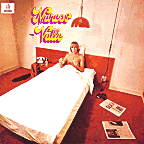 Marcos Valle "Marcos Valle" (EMI-Odeon/Light In The Attic, 1970/2013)
Marcos Valle "Marcos Valle" (EMI-Odeon/Light In The Attic, 1970/2013)


(Produced by Milton Miranda & Lyrio Panicalli)
The first of several long-awaited reissues of experimental early-1970s MPB albums by post-bossa songwriter Marcos Valle, who was always sort of an odd-man out in the Brazilian pop landscape. Valle started his career at the height of the bossa nova craze, but quickly found a separate voice, and embraced a wider musical palette yet never joined the rock-oriented tropicalia movement, and also had a different vibe than the lofty formalism of MPB songsmiths such as Chico Buarque and Ivan Lins. There was a youth-culture feel to his work... but also something else. This album found him at the start of a new decade, moving decisively away from the mellow, bossa-flavored work of his early years and into a more kaleidoscopic, far-ranging sound. I've reviewed this before (unfavorably) but I have to admit, this new reissue has made me more receptive -- the sound quality is much richer than earlier CD editions (which helps) and maybe I've heard more of Odeon "blue Brazil" production since then, and can better appreciate how individual artists were able to thrive inside the sometimes-formulaic orchestrations of the Miranda/Panicalli studio system. Valle revisits his earlier hit, "Os Grilos," and works through several melodic themes while draped inside the half jazz/half orchestral Odeon arrangements... The Golden Boys vocal group backs him on one song; more significantly is the backing of Wagner Tiso's fabled prog group, Som Imaginario (notably on the still-intensely irritating "Suite Imaginaria" medley) as well as early-70s second-stringers Nelson Angelo and bassist Novelli. All in all, a strong example of forward-thinking pop inside the rapidly-changing major label system. Also nice is a bonus track added on the 2012 reissue, "Berenice," which brings us back from the indulgence of the interminable, eight-minute "Suite," which originally closed the album out.
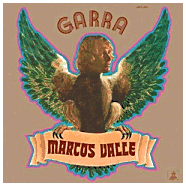 Marcos Valle "Garra" (EMI-Odeon/Light In The Attic, 1971/2013)
Marcos Valle "Garra" (EMI-Odeon/Light In The Attic, 1971/2013)


(Produced by Milton Miranda, Lindolfo Gaya & Mario Rocha)
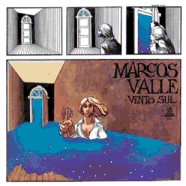 Marcos Valle "Vento Sul" (EMI-Odeon/Light In The Attic, 1972/2013)
Marcos Valle "Vento Sul" (EMI-Odeon/Light In The Attic, 1972/2013)


(Produced by Milton Miranda, Lindolfo Gaya & Renato Correa)
A super-spacy, folk-psychedelic, soundtrack-alicious minor masterpiece, with Valle at his most cosmic and hippiedelic, perhaps at his peak. His brother Paulo Sergio Valle contributes lyrics and a warm, fraternal vibe, while the pioneering Brazilian prog band O Terco provides the backing as Valle experiments with soaring melodies amid vast, open horizons. The emphasis on instrumental music may be seen in part as a way to avoid the scrutiny of Brazil's military censors, but also a reflection of where Valle's head was at the time, in a period said to be dominated by surfing and hanging out at the beach. It's breezy music with surprising heft, and certainly one of the Marcos Valle records you'll want to try out first if you're new to his work.
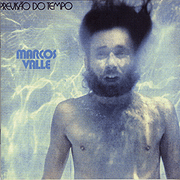 Marcos Valle "Previsao Do Tempo" (EMI-Odeon/Light In The Attic, 1973/2013)
Marcos Valle "Previsao Do Tempo" (EMI-Odeon/Light In The Attic, 1973/2013)


(Produced by Milton Miranda, Lindolfo Gaya & Paulo Cesar Valle)
A real delight! Valle was clearly just out to have a good time with this goofy, funky album, singing super-hummable tunes like "Mentira" and "Previsao Do Tempo," the chirpy title track. Along for the ride are arranger Waltel Branco and Valle's brother, Paulo Sergio Valle, as well as Jose Roberto Bertami and members of his band, Azymuth, lending some sweeping, playful monster-delic Moog riffs. This is certainly one of the catchiest and most memorable of Valle's albums, packed with playful songs and a lighthearted vibe that will keep the tunes echoing in your mind for hours on end... Recommended!
The band Azymuth back Valle on several tracks, while the prog-rock group O Terco plays on two
![]() Various Artists "SOUTH INDIA: MUSIC OF THE NILGIRI HILLS" (Ocora, 2013)
Various Artists "SOUTH INDIA: MUSIC OF THE NILGIRI HILLS" (Ocora, 2013)

![]() Various Artists "PUTUMAYO PRESENTS: VINTAGE FRANCE" (Putumayo, 2013)
Various Artists "PUTUMAYO PRESENTS: VINTAGE FRANCE" (Putumayo, 2013)

New To Me...
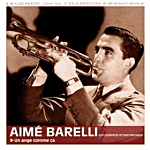 Aime Barelli "Un Ange Comme Ca" (Marianne Melodie, 1999)
Aime Barelli "Un Ange Comme Ca" (Marianne Melodie, 1999)

Jovial, robust postwar swing music from French bandleader, Aime Barelli, a trumpet player who was a fixture on the 1950's Monaco nightclub scene. Barelli was sort of a Harry James/Russ Morgan type player, on the simpler, poppier end of the spectrum, but with a certain uncomplicated charm. In contrast to his rather bland instrumental numbers, these tracks from 1949-55 are mostly fun, French-language vocal performances, with Barelli splitting the lead vocals with Jose Bartel, and chanteuse Lucienne Delyle singing on "Monte Carlo." An excellent set of lively big-band bombast, with a groovy Gallic twist.
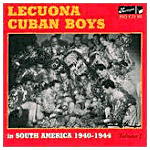 Lecuona Cuban Boys "Volume 7 -- In South America: 1940-1944" (Harlequin, 1996)
Lecuona Cuban Boys "Volume 7 -- In South America: 1940-1944" (Harlequin, 1996)

A nice selection of WWII-era recordings by Ernesto Lecuona's latin dance band, which had relocated to South America for much of the war... This disc has a wide variety of style, ranging from genteel (and occasionally overripe) romantic boleros to more robust dance music, including several big band-influenced "swing" numbers. Lecuona Cuban Boys were always a bit on the lighter side -- not as overtly kitschy as Edmundo Ros or Xavier Cugat, but certainly not as aggressive as Machito or the newer mambo bands. Nonetheless, if you're digging into classic Cuban music, you'll want to check these guys out as well!
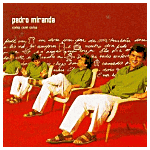 Pedro Miranda "Coisa Com Coisa" (Deckdisc, 2006)
Pedro Miranda "Coisa Com Coisa" (Deckdisc, 2006)


(Produced by Joao Augusto & Pedro 7 Cordas)
Traditionalist acoustic samba from a (former) member of Teresa Cristina's highly-regarded Grupo Semente, gone solo with her blessing (and a nice guest appearance on one of the best tracks on this album...) This is nice stuff, and he hits all the right marks: fans of Paulinho da Viola, Martinho da Vila and like-minded preservationists will enjoy this set. I have to confess this album didn't totally wow me; Miranda's vocals aren't the most expressive and the music, while pleasant, seems a little too controlled and contained overall. Nonetheless, it's all very high quality, and several tracks have made it into long-term rotation at Casa da Slipcue. Definitely worth checking out.
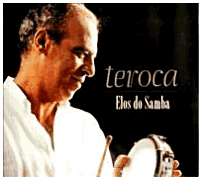 Teroca "Elos Da Samba" (Tratore, 2006)
Teroca "Elos Da Samba" (Tratore, 2006)


(Produced by Tae Rolfson & Teroca)
A beautiful set of old-school acoustic samba, with numerous old-timers joining songwriter/percussionist Marcelo Longo Vidal (aka Teroca) performing a sweet, delicate album of original material, all composed and sung by Teroca himself. There are numerous guest vocalists, most of them pretty obscure, although sambista Wilson Moreira and singer Fabiana Cozza may be familiar names... This is a really lovely record: fans of Paulinho da Viola and Clara Nunes will probably love this one. I did.
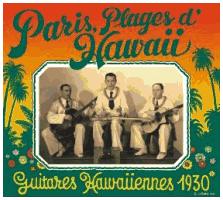 Various Artists "PARIS, PLAGES D'HAWAII: GUITARES HAWAIIENNES 1930s" (Paris Jazz Corner, 2006)
Various Artists "PARIS, PLAGES D'HAWAII: GUITARES HAWAIIENNES 1930s" (Paris Jazz Corner, 2006)

A delicious collection of Depression-era French recordings of Hawaiian and Hawaiian-flavored oldies, including many songs that are Polynesian-themed, and others that are French chanson with steel guitar added in the mix. Most of the tracks are by Parisian guitarist Gino Bordin, mirroring a recent collection of his work on the Grass Skirt label (which is also highly recommended!) There are also a slew of more obscure artists, including several vocal numbers, as well as delightful versions of unlikely tunes, such as classical pieces by Chopin and Rimsky-Korsakoffsky and a gentle, simple rendition of "Amapola," along with waltzes and snippets of French operetta, all given a little steel guitar zing. There are a few other France-meets-Hawaii collections out there, but this is certainly one of the finest. A real winner!




